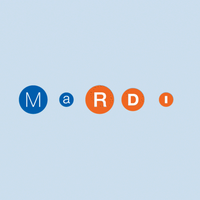MaRDI consortium
 The Mathematisches Forschungsinstitut Oberwolfach is part of the "Mathematical Research Data Initiative" (MaRDI) consortium. Beginning in October 2021 the consortium will be funded over a period of 5 years.
The Mathematisches Forschungsinstitut Oberwolfach is part of the "Mathematical Research Data Initiative" (MaRDI) consortium. Beginning in October 2021 the consortium will be funded over a period of 5 years.
The MaRDI consortium is coordinated by the Berlin Weierstrass Institute for Applied Analysis and Stochastics (WIAS). It currently includes 23 other partners (universities and research institutes, scientific infrastructure facilities, clusters of excellence as well as the German Mathematical Society DMV and the European Mathematical Society EMS).
MaRDI is one of several consortia within the initiative "Nationale Forschungsdateninfrastruktur" (NFDI, National Research Data Infrastructure) which is intended to systematically make valuable data stocks from science and research accessible for sustainable use. According to the the so-called FAIR-principles, data should be easily findable, accessible, interoperable, and re-usable. At the moment, however, a lot of the data is only available locally, project-related and often only for a limited period of time. The consortia shall develop strategies tailored to their scientific disciplines in order to establish a research data management according to the FAIR-principles. The MFO will mainly provide a personal contact point for the mathematical community and as such collect feedback by the community directly and via surveys.
Mathematical research data range from databases for special functions and mathematical objects to aspects of scientific computing such as models and algorithms. They are highly complex, vast and diverse. Due to the interdisciplinarity and the high degree of abstraction of mathematics they are also widespread in other sciences and thus reduce barriers. Specialized search engines make it possible to find mathematical documents and software but are only linked to data to a limited extent. In addition, the volume of data and the speed at which it is generated are increasing dynamically with the rapid development of mathematics in data science and the constantly increasing computing power. In various disciplines (such as physics, chemistry, engineering, humanities, and life sciences) this leads to increasingly complex mathematical models and mathematical research data.
Together with the mathematical community, MaRDI intends to develop methods and tools to implement the FAIR-principles for mathematical research data. With the MaRDI portal an infrastructure will be created which enables the systematic backup, indexing and utilization of mathematical research data via decentralized knowledge and data repositories. In this way, MaRDI will not only inspire research in mathematics, but also have a broad impact in other scientific fields.
Subscribe to the MaRDI newsletter: Math & Data Quarterly
